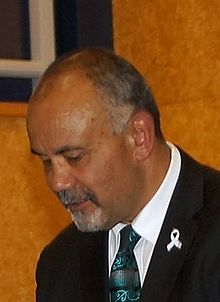Minister of Māori Affairs
| Minister for Maori Development | |
|---|---|

|
|

|
|
| Ministry of Maori Development | |
| Style | The Honourable |
| Member of | Executive Council |
| Reports to | Prime Minister of New Zealand |
| Appointer | Governor-General of New Zealand |
| Term length | At Her Majesty's pleasure |
| Formation | 27 August 1858 |
| First holder | William Richmond |
| Salary | $243,841 |
| Website | www.beehive.govt.nz |
The Minister for Māori Development is the minister of the New Zealand government with broad responsibility for government policy towards Māori, the first inhabitants of New Zealand. The current Minister for Māori Development is Te Ururoa Flavell. Between 1947 and 2014 the position was called Minister of Māori Affairs; before that it was known as Minister of Native Affairs.
The role of the Minister for Māori Development differs somewhat from those of other ministers. While the Minister of Māori Development does have a government department to supervise (Te Puni Kōkiri, TPK for short, or the Ministry of Māori Development), he or she also has input into other portfolios to the extent that they affect Māori. For example, the Minister of Māori Development would expect to be involved in the development of Māori language policy in the education portfolio, even though education is normally the sole responsibility of the Minister of Education.
The office was originally called Minister of Native Affairs, or simply Native Minister. Most early Ministers of Native Affairs were not Māori, although a convention existed that there should be Māori in Cabinet (albeit without portfolio). Prior to the implementation of responsible government, Māori affairs (specifically the purchase of land from Māori by the Crown) had been handled by the Governor.
Attitudes of early Ministers were varied. The first Minister, William Richmond, considered Māori to be savages, and believed that his task was to "reform" Māori by making them more like Europeans. He was particularly hostile to Māori tradition of shared land ownership, considering it "beastly communism". Other Ministers were more friendly to Māori interests — James FitzGerald, the sixth Minister, believed that peaceful co-existence with Māori was vital, and considered the confiscation of Māori land to be an "enormous crime". Other Ministers have varied between these positions.
The first Minister of Native Affairs to be ethnically Māori was James Caroll, appointed by the Liberal Party in the late 19th century. Another prominent Minister of Native Affairs was Āpirana Ngata, also of the Liberals. For the most part, however, early Ministers were Pākehā, although were frequently advised by Māori colleagues. Maui Pomare of the Reform Party and Eruera Tirikatene of the Labour Party were examples of politicians who played a major role in the portfolio without actually holding office. After Caroll and Ngata, it was not until Matiu Rata (1972–1975) that there was another ethnically Māori Minister of Māori Affairs.
...
Wikipedia

